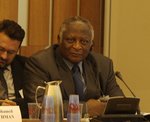Bernard Muna
contribution 06 -
MUNA Bernard Acho

original version
Thank you, Mr. Chairman. I do not think that the phrase « completion strategy » is really apt to describe what we are eventually obliged to do, not only through discussions but through the pressure of the budgetary committee of the United Nations. It was a question of stop strategy rather than a completion strategy.
A completion strategy involves the completion of your work. I don’t think that what the Tribunals were asked to do was to complete their work. They said : « Enough is enough. We the politicians say you have to stop sometime. » And they have to bring out something which was acceptable to stop. When we are talking about independent tribunal, we must recognise the fact that the decisions that matter are taken by political authorities. I think we should get out of the illusion that we’re independent in the sense of deciding whether justice has been done or not. We probably are only independent when we are in the cases, doing the cases. But in the final analysis, the political authority tells us when to start, finances us, and tells us when to stop. And if we don’t stop, they cut off the finances and we have nothing to do with it.
So this is the reality of the situation. I think that in the International Tribunal we shouldn’t have an illusion that our independence will go so far as to enable us to do justice as we feel that it should be done. Because definitely in the Rwanda situation as Ambassador Del Ponte said, to try part of the people, that is not justice.
I’m not even talking just between the RPF and FAR. I’m even talking between part of the FAR and part the FAR not tried and the RPF. We have not done our job, and I think this is counterproductive maybe to the process of healing and reconciliation. So the “stop strategy” really has nothing to do with what we wanted to do. I just wanted to add.
Andrew Clapham
Thank you. Yes, Chile Eboe-Osuji would like the floor.
Chile Eboe-Osuji
Thank you, Mr. Chairman. The question is to the two Ambassadors who are also former prosecutors. Having realised that the completion strategy might have been a mistake or might have taken a turn that it wasn’t intended to take, what can you do to correct it ?
Andrew Clapham
I’m going to give both Prosecutors a chance to have their final word at the end of the session, rather than get into a back‑and‑forth. But on this question of the end game or completion strategy, it was raised by the Prosecutor that a lot of the evidence is oral and maybe in the short‑term one needs to consider the possibility of trials in absentia. I wondered if any of the participants would like to react to that, or are we going to leave that hanging in the air ? Yes, Mr. Muna, again.
Bernard Muna
In the case of the Rwanda Tribunal, I think part of the purpose of creating the Tribunal was to bring reconciliation. I think that the lack of this trial in absentia meant that not even the Rwandan society, not even the witnesses could bring their own part to a closure. I think that the trial in absentia would have brought at least part of the healing process to a closure. They would have heard the case, the society in Rwanda would have known partially that these guys were responsible. The victims would have had their testimonies, the witness would have given their testimonies, and I think it would have been a partial closure.
But I think that the lack of this trial in absentia meant that everything was hanging. And until today, are the witnesses are alive ? Some of them are dead. Some of the victims are tired, are fed up, testimonies taken 15 years ago and nothing is happening and so forth. I think that the lack of this trial in absentia has caused some harm to the Tribunal and to the strategy of reconciliation at least.
Andrew Clapham
Thank you. At this point, I’d like to give the floor to Jean‑Marie Biju‑Duval.

